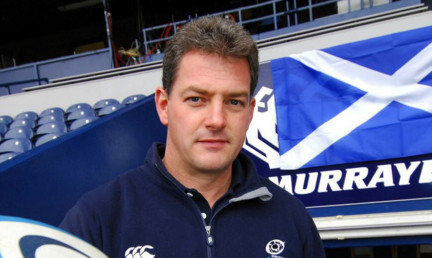Dundee HSFP coach Colin Robertson is leaving his club in good order, but believes they won’t thrive at the top level unless the whole rugby community in the city get their act together.
Robertson will step down as head coach at Mayfield at the end of the season, having piloted a radical overhaul of playing personnel when two thirds of the first XV left after relegation from the BT Premiership.
The main reason for leaving is he feels he needs a break after 26 consecutive years of coaching rugby at levels from juniors through to international age-group, but the former Scotland Under-20 head coach is also frustrated at the lack of progress towards “joined-up” rugby in the city.
“This is a great club with a good infrastructure,” he says of High. “But the biggest frustration for me is rugby in Dundee as a city.
“I’m not convinced we’ve got a model at the moment which gets the best out of rugby in Dundee. Things happen too often by chance.
“We only have one state school out of seven, Harris, playing regular rugby. Maybe this is a football city as they say, but there’s more than enough scope for rugby to thrive.
“When I was a coach with Tom Dymock at Mayfield in 1992 to 1994, we were having this same discussion, nothing’s changed for 20 years. There’s always been discussion, an association, but have really made any progress for rugby in the city?”
While historically the senior club in the city in league terms fluctuated, High have now been the leading club for nearly 30 years, he argues.
“We have the same situation, Dundee at the top end of the pyramid and the other clubs playing away, sometimes getting better for a while and then dropping back.
“Meanwhile Dundee have been up and down from the Premiership, when surely it’s in the interests of our game that they stay there. You look at Ayr as a good example of a club that’s established themselves in the top flight.
“They’ve got a club academy now, not a big formalised thing but the best club players being looked after in more detail, with strength and conditioning, nutrition and technical skill work. I think that would work very well in Dundee.
“It wouldn’t be the guys who are on the SRU pathway, but who knows, you could help late developers who could aspire to pro rugby.”
Robertson understands the delicacies of making High a senior club with the other city teams feeding into them, but believes it would be more beneficial for rugby in Dundee as a whole.
“You need collaboration, a strong team with a feeder system, like the Borders model and like you see a lot in England,” he said. “At the moment, it happens by accident, a good player just gravitates to Mayfield and it’s resented by the team he leaves.
“A formalised structure would help everybody, with players feeding up and down. A club stayibng in the top division would also help us take rugby into more state schools, we need at least two or three regularly playing games.”
Dundee can also learn from near-neighbours like Howe of Fife, he believes.
“Howe are a good, well-organised club and they’ll be promoted this season, if they don’t it’ll be a travesty,” he said. “They’ll more than hold their own in National One, and they have a solid structure.
“I just think we’re missing a trick in Dundee. We could be like Ayr and Stirling County are, with many more playing the game.”
As for High, Robertson ended up with a bigger challenge than he anticipated, but is confident they are on the up again.
“The squad’s in a good position for the rest of the season,” he said. “The stars would have to align for us to be promoted now but you never know what could happen, and there’s ambition for it to happen from me and the players.
“Going forward, half the team every week is aged between 18 and 20, and they’ve all got games under their belt and more confidence. There’s a lot of credit to senior players like Alan Brown and Andy Dymock, we’ve had to change from a mature team that nearly won the Premiership and their input has been essential.
“It’s been a different challenge than I expected, and I’m pleased with the way the team’s evolving, and the stronger ties we have with the University now.
“The club were keen for me to stay, but it’s my decision. It’s not my full time job, and it takes up so much of my spare time. Having done that for so long I need to take a break.”
